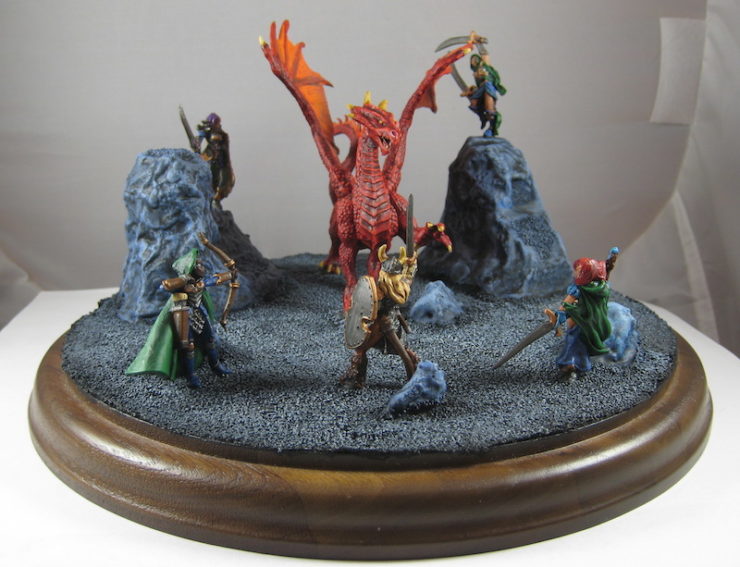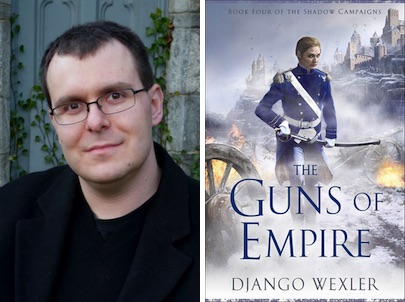Django Wexler’s latest novel, The Guns of Empire, is the fourth book in the The Shadow Campaigns. Based in the Napoleonic Wars, Wexler’s fantasy combines muskets and bayonets with magic, and draws on military history to create a world of brutal battles and fascinating gender politics. The Guns of Empire was unleashed into the world just last week, and Wexler took to reddit to answer questions about research, Napoleon, gaming, and his love of anime. I’ve rounded up a few highlights below!
Let’s get the most important question out of the way first: No, Django Wexler does not listen to the Django theme song while he writes (because it gets stuck in his head and he can’t get it back out) and yes, the “D” is silent.
Now, on to the rest! Let’s start with some research:
RuinEleint: I saw on a recent interview that one of the inspirations for the setting of the Shadow Campaign was reading David Chandler’s book on Napoleonic warfare. So my questions are: How much research did you need to actually get the nitty gritties of warfare down to a plausible narrative? What did you find harder to write—the relatively small battles of Book 1 or the increasingly more complex battles of the later books? As a writer, do you prefer the “fog of war limited PoV” or the omniscient strategic PoV while describing a battle?
DW: By the time I set out to really do research on the Napoleonic Wars, I had a fair bit of reading done already. That said, I went through maybe a half-dozen books to get a better feel for some of the moving pieces? The nice thing about fiction as opposed to history is you don’t have to be exhaustive, just reasonable. The trouble with the big battles is it’s easy to describe them in broad, sweeping terms: “this division attacked”, “that one was routed”, etc., without really getting a feel for what those things mean at the level of actual human beings. It’s one of the reasons I started with smaller actions and worked my way up—having been with Winter in an infantry attack, the reader might have some idea what that looks like. So the larger battles are definitely trickier, because it’s hard to convey what’s going on without getting confusing. Omniscient POV would be easier but I think it would ruin the effect I’m going for. There are times when it’s appropriate (R. Scott Bakker’s series comes to mind) but the emphasis in The Shadow Campaigns is very much on the war as experienced by actual people, and you don’t get that through a history-book style description of a conflict.
Hergrim: How much did the various women known to have disguised themselves as men influence your development of Winter and, if any, were there any in particular who you drew on?
DW: I read quite a few of those stories before writing the series. Winter isn’t based on any of them in particular, but there’s some common elements—often, for example, the woman’s immediate companions would find out, but agree to keep her secret. The big thing was understanding that this really happened, not once but literally hundreds of times—the Napoleonic era and the American Civil War were probably the golden age of women dressing as men to be soldiers. (After the rise of big, anonymous armies, but before good medical services.)
Wexler had such a perfectly deep-cut Napoleon conversation with Redditor Driftpeasant that we are reproducing it here in full—hold on to your bicornes:
Driftpeasant: Do you feel like Napoleon’s decision to use the TIFF format for his battle plans was a factor in his loss at Waterloo? Some historians, mostly at Sandhurst, suggest that this was more inefficient than Wellington’s use of BMP, contributing greatly to the loss. Others, notably the Army War College, suggest that both are equally large for that time period and that it was not a factor. Where do you stand?
DW: While Napoleon had access to high-speed data transmission via the Chappe Visual Telegraph, reaching speeds of more than 100 miles per hour, his bandwidth was still extremely limited. With 196 symbols and roughly one symbol per minute, his line could transmit roughly 0.13 bits / second. A modest-sized image of 1 MB would thus take roughly 2.04 years to transmit, assuming no downtime on the line. With that in mind, an image format involving compression would probably be recommended, even if the quality was lower.
See? That was a lot of Napoleon right there.
Wexler also delved into the influence of gaming and anime on his books:
Frankweiler: Are you a Myst fan by any chance? I get some definite Myst vibes from the Forbidden Library books, but that might just be wishful thinking…
DW: Myst definitely had a big influence on The Forbidden Library. The idea of going through a book into a new world, and especially of being able to create the world by writing the book, probably came from there among other places!
Tjhan: What kind of influence does anime have on your work? Forbidden Library feels like Card Captor Sakura for example. It seems like my primary hobbies of anime/manga (since I was 8) and fantasy novels (later in life) are finally intersecting, I’m totally a big fan of this generation of young anime-watching authors like yourself, Will Wight, Chris Wooding, Brandon Sanderson and others.
DW: It definitely has a pretty big impact. CCS is probably the direct ancestor of The Forbidden Library, along with some weirder stuff like Yami to Boushi to Hon no Tabibito. The popularity of anime is making that stuff worm its way into the mainstream!
Jameslsutter: What was your inspiration for the swarmers, the murderous kiwi-things in The Forbidden Library? Did you have a bad experience with a kiwi?
DW: I think I was inspired by the little blobs that help carry coal in Miyazaki’s Spirited Away. But I wanted something that could be cute, but also threatening!
Djoric:What is your Stand and what are its powers?
What’s the deal with the chicken?
Paul-ish: In the Guns of Empire someone describes a historic kingdom ruled by a chicken for a year. I know a lot of your work is inspired by real world history, so I was wondering if there was real world inspiration behind the chicken empire?
DW: Not really, but there are definitely times and places where some sacred thing, an animal, an idol, a waterfall, etc, is “ruling” a country, which actually means that the priests who interpret what the sacred thing wants are in charge. Caligula (allegedly) wanted to make his horse a consul, probably as a giant middle finger to his political enemies in the senate rather than because he was insane.
What books influenced The Guns of Empire, and what is Wexler reading now?
DW: Authors that directly inspired The Shadow Campaigns were George R. R. Martin and S. M. Stirling… his old series The General with David Drake was my direct inspiration, but my favorite of his is probably still Island in the Sea of Time. Right now I’m reading Max Gladstone’s Four Roads Cross, which is fantastic!
On the avoidance of tropes:
Slapthefrenchman: One of my favorite aspects of your series is its defiance of some common tropes, such as the Tragic Queer Romance, agency of men vs. women, etc. As a writer, do you intentionally set out to “do things differently” for a character, or does it just happen naturally?
DW: I’d like to say that I just ignore tropes and do my own thing, but that obviously isn’t true. I think I start out by trying to get a handle on the characters and let things happen naturally, but as it goes on I try to look with a trope-y eye and see if anything bad jumps out at me.One trope I very deliberately avoided was what TVTropes calls Men Are The Expendable Gender—roughly speaking, where you have female heroes who fight, but they generally don’t get hurt, and all the grunts on both sides are men. One of the reasons the Girls’ Own is in the books is I wanted to be clear there were women fighting who don’t have Magic Protagonist Armor.
Losing Dragons to Fire Would Be Terribly Ironic
Realrakdaddy asked: A fire breaks out in your home, and you only have time to grab one handful of your miniatures. What do you take?
DW: Hmm. Probably the diorama I made with the dragon. But that’d be a hard choice. Honestly if the house was on fire I’d grab my cats first!
Which, obviously, grab the cats first, but check out a detail from the dragon diorama:

You can read the entire AMA with Django Wexler over on reddit!










